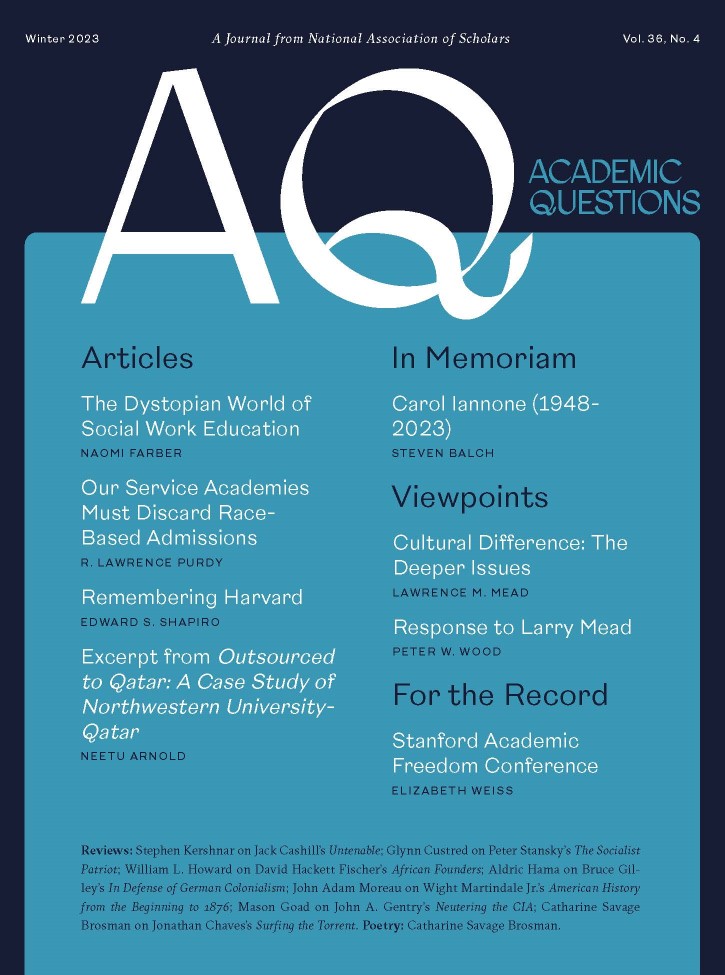IN MEMORIAM
Carol Iannone (1948-2023)
Steven Balch looks back at the career of a treasured colleague.
ARTICLES
The Dystopian World of Social Work Education
Naomi Farber, University of South Carolina College of Social Work
A social work insider explains that social justice doctrine, Critical Race Theory, and the attendant collapse of academic standards has become even more widely and deeply entrenched within social work academe than when the NAS last reported on this subject in 2019. Today these creeds are “enforced aggressively by institutionally internal and external, formal and informal sources of professional authority.”
Remembering Harvard
Edward S. Shapiro, Seton Hall University
When historian Edward Shapiro attended graduate school at Harvard University in the 1960s, the history department was a “jewel in Harvard’s crown.” Shapiro left Harvard in 1963 just prior to the “fevers which were soon to afflict the academy,” but he notes that few in the department during his stay sought to “write history as one voted,” or to see history through the blinding prism of identity.
Our Service Academies Must Discard Race-Based Admissions
R. Lawrence Purdy
The recent Supreme Court ruling in SFFA v. Harvard struck down the use of race in college admissions but did not address the propriety of such in the U.S. military service academies. Despite the obvious need for a unified military that recruits and trains the best, Constitutional lawyer Lawrence Purdy ponders the continuing support for race-based hiring and promotion among the military’s top brass.
Excerpt from Outsourced to Qatar: A Case Study of Northwestern University-Qatar
Neetu Arnold, National Association of Scholars
The small but wealthy Middle East “petrostate” of Qatar has emerged as the top foreign funder of American universities, donating at least $4.7 billion between 2001 and 2021. The 2022 NAS report is a case study of Northwestern University-Qatar and reveals how Qatar uses partnerships with American universities to advance its own interests.
VIEWPOINTS
Cultural Difference: The Deeper Issues
Lawrence M. Mead, New York University
Political scientist Lawrence Mead argues that much of the racial inequality in America stems from the cultural differences between those of European descent and those from non-European regions of the world. Mead insists that the scions of European individualism are better equipped to thrive in a competitive United States, while non-European groups are cautious, adjusting to their environment rather than remaking it for their own advantage.
Response to Larry Mead
Peter Wood, Academic Questions, National Association of Scholars
Peter Wood recognizes a role for beliefs, behavior patterns, and attitudes in disparate social outcomes, but takes issue with the way in which Mead deploys the term “culture.” Mead, says Wood, fails to recognize that cultures are amorphous and always in flux, with considerable variation among and within large cultural groupings, including within the Western tradition itself. “Cultures are important,” Wood writes about Mead, but “they are more confounding than he seems to realize.”
FOR THE RECORD
Stanford Academic Freedom Conference
Elizabeth Weiss, San José State University, Heterodox Academy Center for Academic Pluralism
Anthropologist Elizabeth Weiss gives a blow-by-blow report based on her participation in the Stanford Academic Freedom Conference on November 4th and 5th of 2022. The conference was organized in the wake of the unprecedented censorship of Stanford scientists who dissented from established policy during the Covid-19 pandemic. The conference featured a range of perspectives on the state of academic freedom as well as suggestions for counteracting censorship in the academy.
REVIEWS
Among the books under review in this issue of AQ is an account of Jack Cashill’s fascinating memoir Untenable: The True Story of White Ethnic Flight from America’s Cities. Cashill’s book focuses on the city of Newark, NJ and challenges the academically entrenched view that whites left urban centers in droves during the postwar decades because of anti-black prejudice. Instead, Cashill identifies large roles for destructive federal housing programs, deteriorating public schools, and exploding crime rates.
Glynn Custred tackles the latest iteration of George Orwell’s life and career, The Socialist Patriot: George Orwell and War by Peter Stansky. Stansky focuses on Orwell’s involvement in the Spanish Civil War and his shifting approaches to the Nazi menace.
William Howard reads African Founders: How Enslaved People Expanded American Ideals by renowned historian David Hackett Fischer and concludes, “Like other outstanding works of scholarship, this book not only clarifies the period of its focus but stimulates questions about subsequent history as well.”
Aldric Hama looks at Bruce Gilley’s In Defense of German Colonialism: And How its Critics Empowered Nazis, Communists, and the Enemies of the West, writing that Gilley does another fine job of laying out the advantages for those subject to European colonial rule, this time specifically to German colonial rule. Hama sees the need for more research on the largely neglected field of colonialism in the Far East, especially on the role of imperial Japan.
John Adam Moreau insists that in Wight Martindale Jr.’s American History from the Beginning to 1876: A Home School Guide, we finally have the appropriate rigor, balance, passion, and accessibility in an American history text for high school students: a sure antidote to the “boredom” and “indifference” resulting from standard textbook American “history by committee.”
NAS researcher Mason Goad is convinced by John A. Gentry’s explanation for how the U.S. security agencies have become corrupt in Neutering the CIA: Why US Intelligence Versus Trump Has Long-Term Consequences.
Finally, Catharine Savage Brosman reminds us that creating a body of worthy poetry today is no easy feat, requiring both experience and learning. But Jonathan Chaves has apparently achieved this feat in his Surfing the Torrent, “prima facie support for poetic tradition.”












